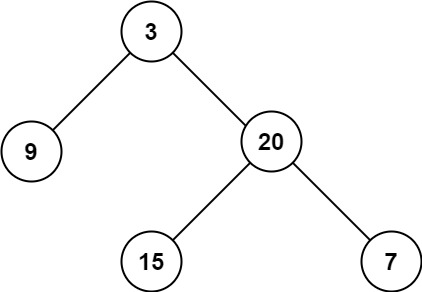2.8 KiB
2.8 KiB
Leetcode Maximum-Depth-Of-Binary-Tree
2022-07-05 09:25
Algorithms:
#algorithm #BFS
Data structures:
#DS #binary_tree
Difficulty:
#coding_problem #difficulty-easy
Additional tags:
#leetcode
Revisions:
N/A
Related topics:
tag:#BFS
- Breadth First Search
- Leetcode Binary-Tree-Level-Order-Traversal
- Leetcode Search-In-a-Binary-Tree
- Leetcode Symmetric-Tree
- Leetcode Two-Sum-IV-Input-Is-a-BST
Links:
Problem
Given the root of a binary tree, return its maximum depth.
A binary tree's maximum depth is the number of nodes along the longest path from the root node down to the farthest leaf node.
Examples
Example 1:
Input: root = [3,9,20,null,null,15,7] Output: 3
Example 2:
Input: root = [1,null,2] Output: 2
Constraints
- The number of nodes in the tree is in the range
[0, 104]. -100 <= Node.val <= 100
Thoughts
[!summary] This problem can be solved by #BFS or #DFS
BFS way: Simply log the level in each while iteration.
DFS way: (Popular) Use recursion:
- Base Case:
- root == nullptr: return 0;
- maxDepth(root) = max(maxDepth(root->left), maxDepth(root->right))
Solution
DFS Recursion:
/**
* Definition for a binary tree node.
* struct TreeNode {
* int val;
* TreeNode *left;
* TreeNode *right;
* TreeNode() : val(0), left(nullptr), right(nullptr) {}
* TreeNode(int x) : val(x), left(nullptr), right(nullptr) {}
* TreeNode(int x, TreeNode *left, TreeNode *right) : val(x), left(left),
* right(right) {}
* };
*/
class Solution {
public:
int maxDepth(TreeNode *root) {
// DFS
if (!root) {
return 0;
}
return max(maxDepth(root->left), maxDepth(root->right)) + 1;
}
};
BFS:
/**
* Definition for a binary tree node.
* struct TreeNode {
* int val;
* TreeNode *left;
* TreeNode *right;
* TreeNode() : val(0), left(nullptr), right(nullptr) {}
* TreeNode(int x) : val(x), left(nullptr), right(nullptr) {}
* TreeNode(int x, TreeNode *left, TreeNode *right) : val(x), left(left),
* right(right) {}
* };
*/
class Solution {
public:
int maxDepth(TreeNode *root) {
// BFS
int levels = 0;
queue<TreeNode *> pending;
TreeNode *ptr = root;
if (ptr)
pending.push(ptr);
while (!pending.empty()) {
levels++;
for (int i = 0, size = pending.size(); i < size; i++) {
ptr = pending.front();
pending.pop();
if (ptr->left)
pending.push(ptr->left);
if (ptr->right)
pending.push(ptr->right);
}
}
return levels;
}
};
